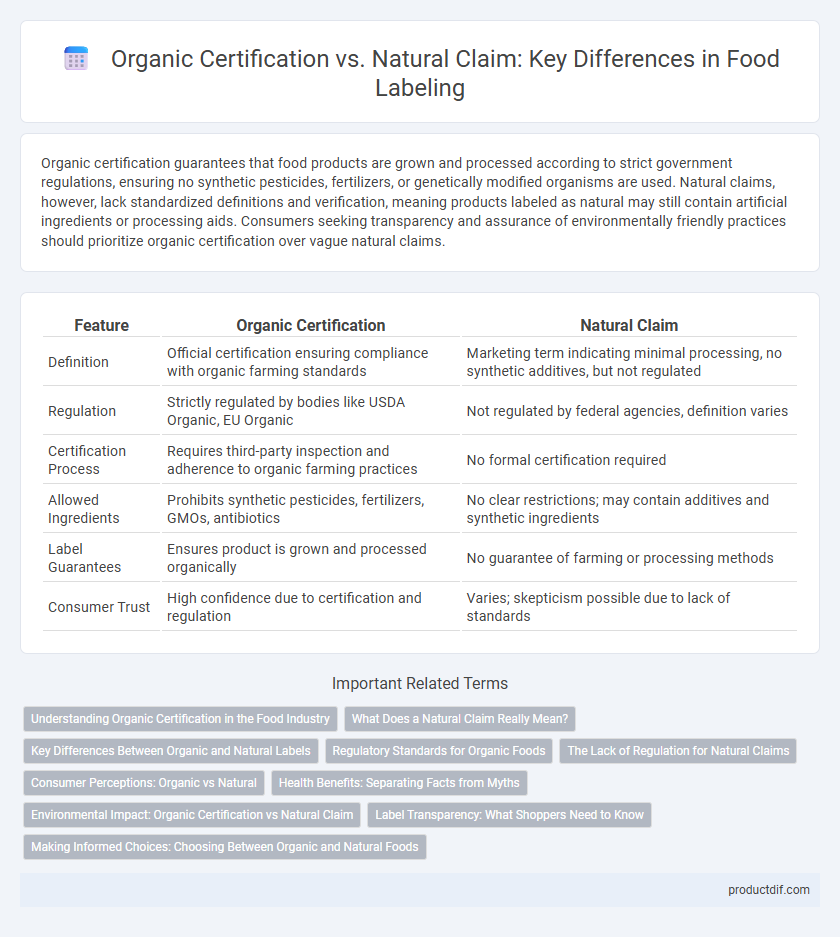Organic certification guarantees that food products are grown and processed according to strict government regulations, ensuring no synthetic pesticides, fertilizers, or genetically modified organisms are used. Natural claims, however, lack standardized definitions and verification, meaning products labeled as natural may still contain artificial ingredients or processing aids. Consumers seeking transparency and assurance of environmentally friendly practices should prioritize organic certification over vague natural claims.
Table of Comparison
| Feature | Organic Certification | Natural Claim |
|---|---|---|
| Definition | Official certification ensuring compliance with organic farming standards | Marketing term indicating minimal processing, no synthetic additives, but not regulated |
| Regulation | Strictly regulated by bodies like USDA Organic, EU Organic | Not regulated by federal agencies, definition varies |
| Certification Process | Requires third-party inspection and adherence to organic farming practices | No formal certification required |
| Allowed Ingredients | Prohibits synthetic pesticides, fertilizers, GMOs, antibiotics | No clear restrictions; may contain additives and synthetic ingredients |
| Label Guarantees | Ensures product is grown and processed organically | No guarantee of farming or processing methods |
| Consumer Trust | High confidence due to certification and regulation | Varies; skepticism possible due to lack of standards |
Understanding Organic Certification in the Food Industry
Organic certification in the food industry ensures products meet strict standards set by regulatory bodies such as USDA or EU Organic, confirming the absence of synthetic pesticides, fertilizers, and genetically modified organisms. This certification involves thorough inspections, documentation, and adherence to sustainable farming practices that promote soil and ecosystem health. Natural claims, in contrast, lack standardized definitions and regulatory oversight, making organic certification a more reliable indicator of product quality and environmental responsibility.
What Does a Natural Claim Really Mean?
A natural claim on food labels indicates the product is made from ingredients derived from nature without artificial additives, but it lacks strict regulatory standards compared to organic certification. Organic certification requires adherence to rigorous USDA guidelines ensuring no synthetic pesticides, fertilizers, or genetically modified organisms are used. Consumers seeking assurance of sustainable and chemical-free farming should prioritize organic labels over vague natural claims.
Key Differences Between Organic and Natural Labels
Organic certification requires strict adherence to USDA standards, involving no synthetic pesticides, fertilizers, or genetically modified organisms (GMOs), whereas natural claims lack standardized regulatory definitions and often refer to minimal processing without synthetic additives. Organic labels undergo rigorous third-party verification, ensuring traceability and transparency from farm to shelf, while natural claims rely on manufacturer honesty and marketing practices. Consumers seeking guaranteed environmental sustainability and chemical-free farming should prioritize organic-certified products over those labeled merely as natural.
Regulatory Standards for Organic Foods
Organic certification requires strict compliance with regulatory standards established by agencies such as the USDA or EU Organic, enforcing controls on synthetic pesticides, GMOs, and soil management practices. Natural claims, however, are often less regulated, lacking a unified definition and allowing more flexibility in production methods and ingredient sourcing. Regulatory standards for organic foods guarantee a verified, transparent process, ensuring consumers receive products free from synthetic additives and produced under sustainable agricultural practices.
The Lack of Regulation for Natural Claims
Natural claims on food products often lack standardized regulatory oversight, causing confusion among consumers compared to organic certification, which is governed by strict USDA standards. Organic certification requires adherence to specific agricultural practices, such as avoiding synthetic pesticides and genetically modified organisms, ensuring a transparent verification process. The absence of clear regulations for natural claims allows manufacturers to use the term loosely, making it challenging to assess product integrity and authenticity.
Consumer Perceptions: Organic vs Natural
Consumers often perceive organic certification as a reliable indicator of stringent agricultural standards, including pesticide restrictions and sustainable farming practices. In contrast, natural claims tend to evoke notions of minimal processing and the absence of artificial additives but lack standardized verification. This distinction leads many shoppers to prioritize organic products for health and environmental benefits, while natural labels are often seen as marketing appeals rather than guarantees.
Health Benefits: Separating Facts from Myths
Organic certification ensures that food products meet strict standards free from synthetic pesticides and fertilizers, which can reduce exposure to harmful chemicals and support improved health outcomes. Natural claims, however, lack a regulated definition and do not guarantee the absence of additives or pesticides, making health benefits less certain. Scientific studies show that organic foods often contain higher levels of antioxidants and lower pesticide residues, emphasizing the tangible health advantages of certified organic products over broadly labeled natural foods.
Environmental Impact: Organic Certification vs Natural Claim
Organic certification requires adherence to strict environmental standards, including prohibition of synthetic pesticides and fertilizers, which significantly reduces soil and water contamination. Natural claims lack standardized criteria, often leading to minimal environmental oversight and variable sustainability practices. Choosing organic-certified products ensures verifiable environmental benefits through regulated farming methods that promote biodiversity and ecosystem health.
Label Transparency: What Shoppers Need to Know
Organic certification requires rigorous third-party verification ensuring products meet strict USDA or equivalent standards, guaranteeing no synthetic pesticides or GMOs are used. Natural claims, however, lack standardized regulations and often rely on manufacturer definitions, leading to potentially misleading labels. Shoppers should prioritize certified organic labels for transparency and verified quality while scrutinizing natural claims closely.
Making Informed Choices: Choosing Between Organic and Natural Foods
Understanding organic certification involves recognizing strict USDA standards that verify foods are grown without synthetic pesticides, fertilizers, or GMOs, ensuring rigorous environmental and health criteria. In contrast, natural claims often lack regulatory definition and can vary widely, making transparency and ingredient scrutiny crucial for consumers seeking truly wholesome options. Prioritizing organic certification provides stronger assurance of sustainable practices and product integrity, guiding informed choices in the pursuit of healthy, eco-conscious diets.
Organic Certification vs Natural Claim Infographic

 productdif.com
productdif.com